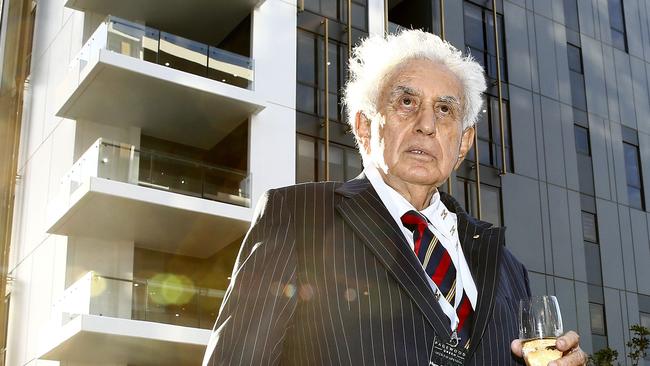Meriton’s Harry Triguboff sees slowly recovering apartment market
Don’t believe the property pessimists like UBS, says apartment king Harry Triguboff. They’ve all got it wrong.

As global investors stampeded for US bonds, sending American yields slumping to the lowest level since January 2018, it caused Australians to re look at our beleaguered housing market.
We now have a fierce outlook debate between Australia’s largest apartment owner and developer Harry Triguboff and the giant global investment house UBS.
One of them will be wrong and the outcome of the debate will play a big role in what happens to the Australian economy, as well as the situation facing the government that takes office after the May election.
And what happens in Australia is linked to what is happening in the US.
Yesterday I set out the gloomy predictions of UBS, which foresees a continuation, and perhaps intensification, of the current credit squeeze, with further falls in property values triggering a sharp economic downturn and lower Australian interest rates.
Triguboff immediately responded with a totally different view of the dwelling market, albeit concentrated on Sydney apartments. Triguboff declared: “The market has definitely stabilised in Sydney. All those people talking about how much it will drop are wrong. In fact, it is improving very slowly.”
Both Triguboff and UBS have a vested interest in their predictions. Triguboff has a large portfolio of apartments and a lot of land where he wants to build apartments. In addition, he able to build apartments cheaper than anyone else because he offers job continuity to his building team. So, longer term, he needs values and demand to hold. UBS brilliantly picked the decline last year and its latest set of predictions are a natural follow through from its earlier ones. If right, UBS will go to the top of the economic forecasting tree.
At the heart of the difference between UBS and Triguboff is the role of banks, as well as the what is happening in the rest of our region.
By far the biggest buyers of Sydney (and Melbourne) apartments are the Chinese. They bought off the plan two or three years ago and as buildings are completed settlements are now coming at an avalanche rate, with prices that are above the current depressed “second hand” values.
When the Chinese committed to buy the apartments Australian banks gave non-binding verbal assurances that they would fund the settlements. They have now shut the door.
But Triguboff says the Chinese have found a way around the problem and “are organising their finance with or without our banks. In many cases they are gaining 10-year fixed loans”.
A jubilant Triguboff says: “This is terrific and is more like it is overseas because people are not required to say how will they refinance after three to five years”.
In this context my commentary from the ADC 2019 Global Blockchain summit in Adelaide become essential for anyone wanting to understand what is happening in global finance.
The future is all about funding cash flows and Triguboff is able to offer a long-term rental cash flow, which becomes the basis for the long-term funding arrangements being negotiated by the Chinese. And when 10-year US bond yields fall from their peak last year of just below 3.2 per cent to around 2.5 per cent loan investors are looking to lock in higher yields. In Australia the long-term corporate bond market is booming.
UBS would argue that suburban houses cannot offer that cash flow and renting is made more dangerous by the tenant protection legislation in most states. In addition, we have the ALP negative gearing changes.
Australian banks operate under the APRA constraints.
In that environment this week’s speech from the Reserve Bank’s assistant governor Michele Bullock was fascinating.
She said: “From a financial stability perspective prudent lending standard are a good thing. But there needs to be a balance. The regulators are not proposing any further tightening in lending standards”.
That about as close as the Reserve bank will ever go to telling APRA and ASIC that they have gone too far, and they are endangering — not protecting — bank balance sheets.
The message from Triguboff is that his Chinese customers have found a way around the regulator-imposed credit squeeze in Australia. And he also believes that the Australian banks, with comfort from the Reserve Bank, are now being more realistic. The way the Chinese are funding real estate and the glimmers of realism from Australian banks are the core difference between the Triguboff and UBS views of the dwelling market. If the Reserve bank lowers interest rates then Australia deposit rates will fall further, so the current boom in higher yield corporate bonds may extend to the housing market.
Albeit with the help of overseas banks the Chinese have shown that long term finance can be arranged. Meanwhile, Triguboff says that while there has been a huge rise in the supply of Sydney apartments it is running out, and there is a big fall in new apartment development looming. The next wave of apartments will contain many more three-bedroom family apartments. And longer-term, future demand will depend on migration rates.
Meanwhile the US bond market is telling us that we are facing a global downturn led by the US, China and Europe. Investors want the security of bonds to ride out the forecast storm. And, of course, as bond yields fall so shares look more attractive. But the share market is dangerous country because if the bond market predictions are right then profits will be reduced a over a range of companies.






